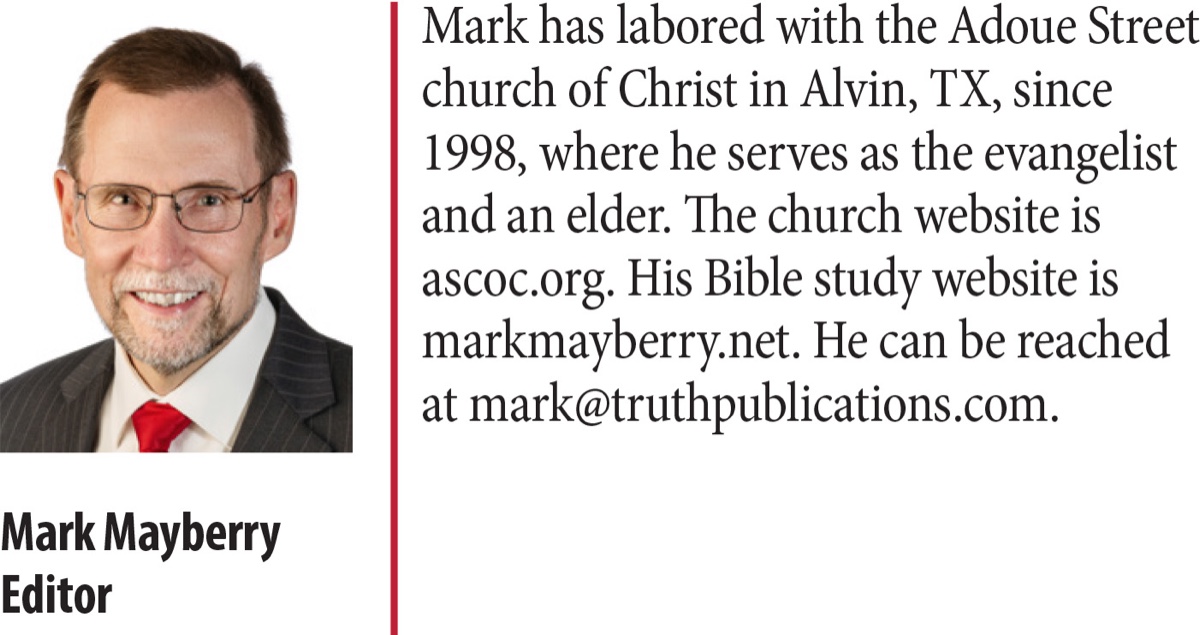By Mark Mayberry
Synopsis: This issue of Truth Magazine focuses on the woke movement. Two articles explore the familiar statement, “Righteousness exalts a nation, but sin is a disgrace to any people” (Prov. 14:34). The next four articles explore the woke movement’s impact upon religion, culture, gender and race.
Oxford’s American English Dictionary defines “label” as (1) “a small piece of paper, fabric, plastic, or similar material attached to an object and giving information about it,” or (2) “a classifying phrase or name applied to a person or thing, especially one that is inaccurate or restrictive.”
As children, I recall that we were fearful of removing the tags from our bedding, lest the Pillow Police haul us away in the middle of the night.
Recently, we had to replace our clothes washer and dishwasher. When the new appliances were delivered, I checked the tags to ensure that the items delivered were the ones we purchased.
In politics and religion, we frequently speak of liberal and conservative, progressive and traditionalist, etc. While these terms may (when used in context) accurately communicate our convictions, they often prove inadequate and easily misunderstood.
Years ago, a former member here at Adoue Street was planning a cross-country trip, and wisely sought to arrange to worship with faithful brethren as he was traveling. He placed a phone call to a congregation in the town where he would be on Sunday, and asked, “Are you liberal or conservative?” He understood the terminology, but the person on the other end of the phone call did not.
Adjectives are useful when used in context. Bigger is better! Right? Not always. As a child, I wanted a liberal (large) scoop of ice-cream, and a conservative (small) spoon of castor oil.
When used positively, both “liberal” and “conservative” are descriptive of God’s people. Christians should be liberal (generous) in their giving (Rom. 12:6-8; 2 Cor. 8:1-2), and conservative (careful) in the stewardship of God’s blessings (1 Cor. 9:16-17; Eph. 3:1-4).
Since we have gifts that differ according to the grace given to us, each of us is to exercise them accordingly: if prophecy, according to the proportion of his faith; if service, in his serving; or he who teaches, in his teaching; or he who exhorts, in his exhortation; he who gives, with liberality; he who leads, with diligence; he who shows mercy, with cheerfulness (Rom. 12:6-8).
Now, brethren, we wish to make known to you the grace of God which has been given in the churches of Macedonia, that in a great ordeal of affliction their abundance of joy and their deep poverty overflowed in the wealth of their liberality (2 Cor. 8:1-2).
For if I preach the gospel, I have nothing to boast of, for I am under compulsion; for woe is me if I do not preach the gospel. For if I do this voluntarily, I have a reward; but if against my will, I have a stewardship entrusted to me (1 Cor. 9:16-17).
For this reason I, Paul, the prisoner of Christ Jesus for the sake of you Gentiles— if indeed you have heard of the stewardship of God’s grace which was given to me for you; that by revelation there was made known to me the mystery, as I wrote before in brief. By referring to this, when you read, you can understand my insight into the mystery of Christ (Eph. 3:1-4).
Nevertheless, while the terms “liberal” and “conservative” may identify where one stands on certain religious issues (when used in context), neither is fully adequate and may reflect a misunderstanding of the gospel message.
When used in theology, “liberal” describes one who “regards many traditional beliefs as dispensable, invalidated by modern thought, or liable to change.”
Certainly, those who have adopted the modern mindset have little respect for God’s Word. Religious liberals have little (or no) concern for scriptural authority—viewing the Bible as a product of human origin, reflecting the ignorance, superstition, bias and bigotry of ancient and unenlightened cultures.
In contrast, faithful Christians recognize that the Bible, being divinely inspired, is a completely reliable guide for this life and the next.
All Scripture is inspired by God and profitable for teaching, for reproof, for correction, for training in righteousness; so that the man of God may be adequate, equipped for every good work (2 Tim. 3:16-17).
For this reason we also constantly thank God that when you received the word of God which you heard from us, you accepted it not as the word of men, but for what it really is, the word of God, which also performs its work in you who believe (1 Thess. 2:13).
But know this first of all, that no prophecy of Scripture is a matter of one’s own interpretation, for no prophecy was ever made by an act of human will, but men moved by the Holy Spirit spoke from God (2 Pet. 1:20-21).
Those who share this view of the Bible often describe themselves as “conservatives.” In a sense, this is entirely appropriate.
When used in a general sense, the word “conservative” describes one who is “averse to change or innovation and holding traditional values,” while in a political context, it refers to one “favoring free enterprise, private ownership, and socially traditional ideas.”
Certainly faithful Christians are averse to unscriptural innovations and hold to traditional values as set forth in the Scriptures.
However, there is another meaning associated with the term “conservative.”
Merriam-Webster says it carries the idea of “(1) a preservative, (2) of or relating to a philosophy of conservatism, (3) tending or disposed to maintain existing views, conditions, or institutions. . .”
Consider the third definition given in the above paragraph. A conservative is one who seeks to maintain existing views, conditions, or institutions.
This approach is workable when people remember and respect the fundamental principles upon which biblical faith is founded. The same holds true concerning western civilization in general and the American experience in particular.
Sadly, our country and culture have drifted so far from its founding principles, there is little left to conserve.
In the inaugural issue of National Review, William F. Buckley (the father of the modern conservative movement) wrote:
A conservative is someone who stands athwart history, yelling “Stop,” at a time when no one is inclined to do so, or to have much patience with those who so urge it—William F. Buckley.
This approach might work if society still remembers its roots and is committed to its founding principles. However, simply yelling “Stop!” is an insufficient strategy, unless we are collectively committed to restoring those founding principles.
A half-century earlier, G.K. Chesterton (who is one of my favorite authors) offered this perceptive comment on progressivism and conservatism. Noting the tendency for things to fall apart, he stressed the remarkable energy that is required to offset the gravitational pull of disorder and decay:
We have remarked that one reason offered for being a progressive is that things naturally tend to grow better. But the only real reason for being a progressive is that things naturally tend to grow worse. The corruption in things is not only the best argument for being progressive; it is also the only argument against being conservative. The conservative theory would really be quite sweeping and unanswerable if it were not for this one fact. But all conservatism is based upon the idea that if you leave things alone you leave them as they are. But you do not. If you leave a thing alone you leave it to a torrent of change. If you leave a white post alone it will soon be a black post. If you particularly want it to be white you must be always painting it again; that is, you must be always having a revolution. Briefly, if you want the old white post you must have a new white post. But this which is true even of inanimate things is in a quite special and terrible sense true of all human things. An almost unnatural vigilance is really required of the citizen because of the horrible rapidity with which human institutions grow old. It is the custom in passing romance and journalism to talk of men suffering under old tyrannies. But, as a fact, men have almost always suffered under new tyrannies; under tyrannies that had been public liberties hardly twenty years before (Orthodoxy, 212–213).
What about the terms “progressive” and “traditionalist?” In its most basic usage, “progressive” describes something “happening or developing gradually or in stages; proceeding step by step.”
Certainly, Christians should constantly seek to grow—adding to their faith (2 Pet. 1:5-7) and progressing spiritually (Phil. 1:23-26; 1 Tim. 4:14-16).
Now for this very reason also, applying all diligence, in your faith supply moral excellence, and in your moral excellence, knowledge, and in your knowledge, self-control, and in your self-control, perseverance, and in your perseverance, godliness, and in your godliness, brotherly kindness, and in your brotherly kindness, love (2 Pet. 1:5-7).
But I am hard-pressed from both directions, having the desire to depart and be with Christ, for that is very much better; yet to remain on in the flesh is more necessary for your sake. Convinced of this, I know that I will remain and continue with you all for your progress and joy in the faith, so that your proud confidence in me may abound in Christ Jesus through my coming to you again (Phil. 1:23-26).
Do not neglect the spiritual gift within you, which was bestowed on you through prophetic utterance with the laying on of hands by the presbytery. Take pains with these things; be absorbed in them, so that your progress will be evident to all. Pay close attention to yourself and to your teaching; persevere in these things, for as you do this you will ensure salvation both for yourself and for those who hear you (1 Tim. 4:14-16).
Since the word “tradition” refers to things that are “handed down,” it is essential that we distinguish between human traditions and divine traditions. Jesus condemned the scribes and Pharisees because they transgressed the commandment of God for the sake of their traditions. By adding to, subtracting from, and changing God’s commandments with brazen impunity, they invalidated the word of God for the sake of their tradition—which rendered their worship as “vain” (Matt. 15:1-14).
While we must avoid binding human traditions or being led astray by such (Col. 2:8), we must respect the inspired apostolic message. Commending the Corinthians, Paul said, “Now I praise you because you remember me in everything and hold firmly to the traditions, just as I delivered them to you” (1 Cor. 11:1-2). When he exhorted the Thessalonians, saying, “So then, brethren, stand firm and hold to the traditions which you were taught, whether by word of mouth or by letter from us,” the context clearly shows that he was speaking of “the faith” communicated through “our gospel” (2 Thess. 2:13-15).
Be imitators of me, just as I also am of Christ. Now I praise you because you remember me in everything and hold firmly to the traditions, just as I delivered them to you (1 Cor. 11:1–2).
But we should always give thanks to God for you, brethren beloved by the Lord, because God has chosen you from the beginning for salvation through sanctification by the Spirit and faith in the truth. It was for this He called you through our gospel, that you may gain the glory of our Lord Jesus Christ. So then, brethren, stand firm and hold to the traditions which you were taught, whether by word of mouth or by letter from us (2 Thess. 2:13-15).
The word “progressive” is often used “(of a group, person, or idea) favoring or implementing social reform or new, liberal ideas. . . favoring or promoting change or innovation.” In politics and religion, today’s progressives view the past with contempt—rejecting the old ways as broken, biased, and beside the point, namely, out of step with their enlightened and elitist views. This is especially true of the woke movement. They deny the very concept of God. Having adopted an atheistic, materialistic, and secularistic view of life, present-day progressives deny the existence of a triune God (who is omniscient, omnipotent and omnipresent, holy, loving, etc.). Moreover, they reject the biblical affirmations that:
God created the heavens and the earth in six literal days.
Man (possessing a dual nature, i.e., body and soul) is superior to the lower creation because he is made in God’s image and has been placed in a position of dominion over nature.
Marriage is a lifelong relationship between a biological male and a biological female wherein a man leaves his father and mother and cleaves to his wife.
Human beings are free moral agents who possess the capacity of understanding God’s commandments, and are obligated to obey His directive, and will be held accountable for their actions.
The creature (man) must worship the Creator (God) by offering sacrifice and service in the manner that He directs.
Men are obligated to walk in God’s ways—calling upon His name and conforming their lives to His standard of righteous conduct.
Sin in all its manifestations (i.e., thoughts, words, deeds) damages personal relationships, degrades the individual who commits sin, debases and can potentially destroy civil society if left unchecked, and, finally, alienates man from his Maker—resulting in the outpouring of divine wrath.
Because man is made in God’s image, human life should be viewed as sacred, and the wanton shedding of man’s blood cannot go unpunished.
Yet, despite man’s tendency toward rebellion, God provides a path of forgiveness and reconciliation. He promised to send a Savior (One born of woman) who would deal with the problem of sin, and inflict a death blow against the serpent/Satan.
Please note that the bullet points above all come from the opening chapters of Genesis. Is it any wonder that the book of Genesis has been a battleground in the modern era? If progressives can destroy the book of beginnings, the entire edifice of divine revelation crumbles into dust. Yet, the foundation of God stands firm!
While terms such as “liberal,” “conservative,” “progressive,” and “traditionalist” may be useful in distinguishing between different approaches to Scripture, let us consider two other concepts that are repeatedly affirmed in the Bible: Repudiation and Restoration.
Instead of rejecting the rule of God in our lives (as do modern progressives and proponents of the woke movement), we must repudiate the old man of sin (Rom. 6:1-7).
What shall we say then? Are we to continue in sin so that grace may increase? May it never be! How shall we who died to sin still live in it? Or do you not know that all of us who have been baptized into Christ Jesus have been baptized into His death? Therefore, we have been buried with Him through baptism into death, so that as Christ was raised from the dead through the glory of the Father, so we too might walk in newness of life. For if we have become united with Him in the likeness of His death, certainly we shall also be in the likeness of His resurrection, knowing this, that our old self was crucified with Him, in order that our body of sin might be done away with, so that we would no longer be slaves to sin; for he who has died is freed from sin (Rom. 6:1-7).
Rather than rely upon subjective self-will, let us renew our respect for God’s law (Isa. 8:19-20), and restore the ancient order (Jer. 6:16-17).
When they say to you, “Consult the mediums and the spiritists who whisper and mutter,” should not a people consult their God? Should they consult the dead on behalf of the living? To the law and to the testimony! If they do not speak according to this word, it is because they have no dawn (Isa. 8:19-20).
Thus says the Lord, “Stand by the ways and see and ask for the ancient paths, where the good way is, and walk in it; and you will find rest for your souls. But they said, ‘We will not walk in it.’ And I set watchmen over you, saying, ‘Listen to the sound of the trumpet!’ But they said, ‘We will not listen’” (Jer. 6:16-17).
Instead of being conformed to this world, we must be transformed by the renewing of our minds (Rom. 12:1-2).
Therefore, I urge you, brethren, by the mercies of God, to present your bodies a living and holy sacrifice, acceptable to God, which is your spiritual service of worship. And do not be conformed to this world, but be transformed by the renewing of your mind, so that you may prove what the will of God is, that which is good and acceptable and perfect (Rom. 12:1-2).
Instead of being unrestrained in our communication and conduct (which is typical of today’s woke activists), let us be reserved in speech and reverent in life (2 Pet. 2:9-16).
. . .the Lord knows how to rescue the godly from temptation, and to keep the unrighteous under punishment for the day of judgment, and especially those who indulge the flesh in its corrupt desires and despise authority. Daring, self-willed, they do not tremble when they revile angelic majesties, whereas angels who are greater in might and power do not bring a reviling judgment against them before the Lord. But these, like unreasoning animals, born as creatures of instinct to be captured and killed, reviling where they have no knowledge, will in the destruction of those creatures also be destroyed, suffering wrong as the wages of doing wrong. They count it a pleasure to revel in the daytime. They are stains and blemishes, reveling in their deceptions, as they carouse with you, having eyes full of adultery that never cease from sin, enticing unstable souls, having a heart trained in greed, accursed children; forsaking the right way, they have gone astray, having followed the way of Balaam, the son of Beor, who loved the wages of unrighteousness; but he received a rebuke for his own transgression, for a mute donkey, speaking with a voice of a man, restrained the madness of the prophet (2 Pet. 2:9-16).
The woke movement claims to be concerned about social injustice and discrimination—which is continually redefined according to an ever-changing subjective standard—while rejecting the authority of God, concerning whom, it is said:
Your throne is established from of old; You are from everlasting (Ps. 93:2).
Forever, O Lord, Your word is settled in heaven (Ps. 119:89).
If we hope to achieve meaningful change, our efforts must be (1) founded upon full and complete obedience to the teaching of Jesus Christ (Matt. 7:24-27), (2) accurately handling the word of truth (2 Tim. 2:14-19), and (3) fulfilling our role as members of the Lord’s church (Eph. 2:19-22).
Therefore, everyone who hears these words of Mine and acts on them, may be compared to a wise man who built his house on the rock. And the rain fell, and the floods came, and the winds blew and slammed against that house; and yet it did not fall, for it had been founded on the rock. Everyone who hears these words of Mine and does not act on them, will be like a foolish man who built his house on the sand. The rain fell, and the floods came, and the winds blew and slammed against that house; and it fell—and great was its fall (Matt. 7:24-27).
Remind them of these things, and solemnly charge them in the presence of God not to wrangle about words, which is useless and leads to the ruin of the hearers. Be diligent to present yourself approved to God as a workman who does not need to be ashamed, accurately handling the word of truth. But avoid worldly and empty chatter, for it will lead to further ungodliness, and their talk will spread like gangrene. Among them are Hymenaeus and Philetus, men who have gone astray from the truth saying that the resurrection has already taken place, and they upset the faith of some. Nevertheless, the firm foundation of God stands, having this seal, “The Lord knows those who are His,” and, “Everyone who names the name of the Lord is to abstain from wickedness” (2 Tim. 2:14-19).
So then you are no longer strangers and aliens, but you are fellow citizens with the saints, and are of God’s household, having been built on the foundation of the apostles and prophets, Christ Jesus Himself being the corner stone, in whom the whole building, being fitted together, is growing into a holy temple in the Lord, in whom you also are being built together into a dwelling of God in the Spirit (Eph. 2:19-22).
In its most basic usage, “woke” means to “emerge or cause to emerge from a state of sleep” or to “stop sleeping.” Yes, we need to “Be woke!” but not in the dystopian and destructive sense of the current fad, but by being alert to the danger posed by the devil (1 Pet. 5:8-9) and the deceptiveness of false doctrines (2 Cor. 11:3), such as those promoted by the woke movement!
Be of sober spirit, be on the alert. Your adversary, the devil, prowls around like a roaring lion, seeking someone to devour. But resist him, firm in your faith, knowing that the same experiences of suffering are being accomplished by your brethren who are in the world (1 Pet. 5:8-9).
But I am afraid that, as the serpent deceived Eve by his craftiness, your minds will be led astray from the simplicity and purity of devotion to Christ (2 Cor. 11:3).
Concluding his first letter to the Corinthian church, Paul said, “Be on the alert, stand firm in the faith, act like men, be strong” (1 Cor. 16:13). Instead of remaining in a state of spiritual slumber, we must awaken to righteousness (Rom. 13:11-14).
Do this, knowing the time, that it is already the hour for you to awaken from sleep; for now salvation is nearer to us than when we believed. The night is almost gone, and the day is near. Therefore let us lay aside the deeds of darkness and put on the armor of light. Let us behave properly as in the day, not in carousing and drunkenness, not in sexual promiscuity and sensuality, not in strife and jealousy. But put on the Lord Jesus Christ, and make no provision for the flesh in regard to its lusts (Rom. 13:11-14).
Unless otherwise noted, all English definitions come from Oxford’s American English Dictionary. Licensed by Squircle Apps LLP. New Delhi, India, 2022.
Chesterton, Gilbert K. Orthodoxy. New York: John Lane Company, 1909.
“Conservative.” Merriam-Webster’s Collegiate Dictionary. Springfield, MA: Merriam-Webster, 1996.



